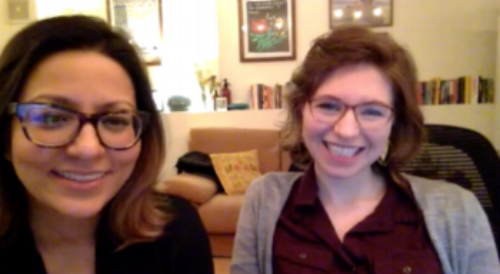PSN Reportback: What is Language Justice and Why Does it Matter in Oral History Work?
In February, oral historian and interpreter Allison Corbett joined Groundswell’s Communications Coordinator Fanny Garcia for a Practitioner Support Network session about language justice and why it matters in oral history work.
Oral historians Allison Corbett and Fanny Garcia.
The sold-out event was designed as an interview between Allison and Fanny about what language justice means and how its different interpretations resonate with both women's connection to language, memory, culture, and oral history.
In the first half of the interview Fanny interviewed Allison about the definition of language justice and how it has become a natural and necessary extension of equality and equity.
Allison responded with a three-pronged definition that has allowed her to view language justice as a broad term for access to resources and space:
- First, language justice is the right to speak the language that we are most comfortable in. To be able to participate fully, to lead full lives regardless of what language a person speaks. She emphasizes the need to make certain tools available to all in order to make this happen including interpretation, translation and resources to provide both and any other tool that a person may need in order to communicate.
- Second, language justice is the ability to create multilingual spaces, not just providing interpretation and translation which are important tools but making the political and intentional decision to set up spaces and organizations and relationships so that the English language is not prioritized. This allows people who are participating and leading can do so fully regardless of which language they speak.
- And third, language justice is the recognition that language can be a site of connection but also of trauma and so this last part of the definition about what language justice means focuses on decolonization and a healing approach to language.
In the second part of the PSN, Allison interviewed Fanny about her interest in language justice and how she sees it as an extension of oral history. In her response, Fanny mentions the importance of identifying how language intersects with race, class and culture in interviews. She explains her own experiences interviewing Central American refugee women and how her Americanized Spanish clashed drastically with her narrator’s Central American Spanish. This difference however contributed a positive shift in the power dynamics of her interviews when her narrators either corrected her Spanish pronunciation or provided a word that escaped her. The negotiation that occurred allowed her narrator more autonomy during her interview and provided Fanny with the opportunity to relinquish control.
The PSN participants contributed case studies in which language justice became a central part of community programming, as well as situations in which it was not. The discussion provided clear examples and guidance about how to go beyond offering only interpreting and translation and reminded everyone that language justice is about creating space and facilitating access to information as well as allowing for many voices to be heard.
Listen to the full audio of the Practitioner Support Network session, HERE.
